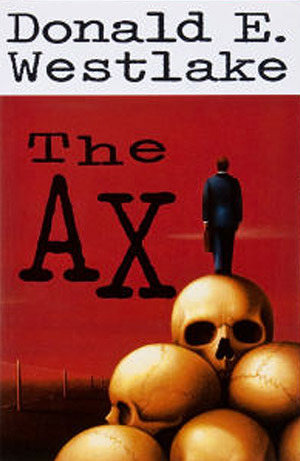 By DONALD E. WESTLAKE (Warner; 1997)
By DONALD E. WESTLAKE (Warner; 1997)
A first-person serial killer novel from one of America’s finest suspense writers. Donald Westlake died in 2008, but during his life turned out mysteries (comedic and otherwise), tough-guy crime novels (as Richard Stark he wrote the unforgettable Parker series) and even a few books that fell into the horror category. THE AX is among the latter, and it’s one of Westlake’s finest works (even if it is quite reminiscent of Ramsey Campbell’s COUNT OF ELEVEN from 1992).
It’s also a novel that’s more relevant now (early 2009) than when it was initially published. Note the critical blurbs on the paperback edition, many of which take the story as farfetched satire: “Westlake amusingly captures the absurdity of an average joe suburb”…“Jonathan Swift would be delighted”…“A very funny, exquisite and deadly satire.” Yet THE AX’S subject, corporate downsizing and its grinding effect on the middle class, is anything but satiric. I wonder how funny the critics quoted above would find this novel today.
The narrator is Burke Devore, a fifty-year-old suburbanite who after 25 years as a paper mill manager has been let go. The story commences two years after the layoff, when Burke’s unemployment insurance has run out and his prospects are nil. In a desperate effort to get a jump on the competition, Burke takes out an ad in a trade paper inviting people to submit their resumes for a bogus company he fronts. His initial impulse is to see first-hand what his competitors have that he doesn’t, but as things get increasingly desperate—with Burke’s wife having an affair and his teenage son turning to crime—he gets a different, far deadlier idea.
Burke’s new plan is simple: pick out those applicants whose resumes are equal to or better than his own in terms of experience, track down those men and kill them. In this way he’ll be able to literally eliminate the competition so that when his former company starts hiring again he’ll be the obvious pick.
I won’t reveal how Burke’s twisted scheme plays out, as a large part of the novel’s compulsive readability is due to its unpredictability. It’s also noteworthy for Westlake’s profoundly corrosive portrayal of middle class desperation, which these days, with killing rampages by laid-off workers becoming depressingly common, is more pertinent than ever.
